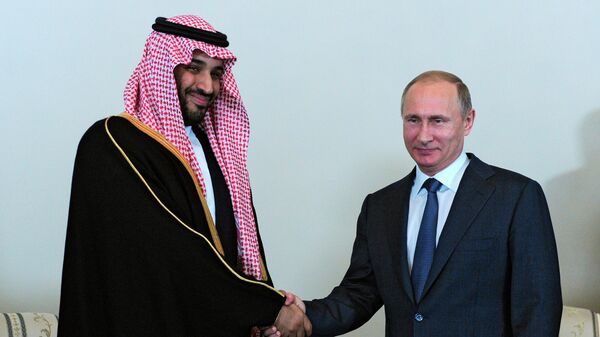The recent US-Saudi oil deal is "doomed to failure," Tim Daiss, oil markets analyst, journalist and author, claims, referring to the agreement struck by the powers on the sidelines of the G20 summit in Hangzhou, China.
Seeking to stabilize oil markets Moscow and Riyadh have pledged to freeze oil production and announced the creation of working group to monitor the market.
Over the last two years oil prices have seen a tremendous slide from almost $114 per barrel to mid-$20s in January 2016. Currently the price is in the mid-$40s.
"Oil producers hope that a production freeze would put a floor under prices. However, a harsher reality is that it might not work. An output freeze wouldn't remove excess oil supply from the market but merely maintain the status quo — not enough to restore market equilibrium and restore loss revenue for both Riyadh and Moscow," Daiss writes in his article for Forbes, arguing that the only way to halt the slump in oil prices is "to actually cut production."
However, according to Natalia Milchakova, Deputy Director of Alpari's Analytical Department, the situation is not as dire as it seems.
In an interview to Russian online newspaper Vzglyad Milchakova drew attention to the fact that despite its previous bravado Saudi Arabia is suffering the consequences of the two-year slump in crude prices and is extremely interested in cooperation with Moscow.
Riyadh's decision to increase the price of oil for Asia and the US in October signaled the kingdom's shift from its earlier "dumping" strategy.
Furthermore, experts point to the fact that Riyadh's ambitious Vision 2030 plan needs high oil prices to kick off structural changes such as carrying out a successful IPO of Saudi Aramco.
According to Milchakova, the recent Russo-Saudi agreement is a win-win situation for both parties.
Currently, Iran is unlikely increase its oil production sharply due to lack of investments, Polkhovsky believes.
"At the same time [Iran] has returned its market share. Therefore there is no sense in demanding that Iran participate in the agreement. [The sides] may continue to wage price wars, but as a result they would sustain huge economic losses," the analyst emphasizes, suggesting that Riyadh can't afford to further manipulate crude prices.
Milchakova predicts that oil prices would be frozen in late September.
"I believe that the oil extraction would not be cut as in 2009 and 1999 amid similar oil markets crises, instead it would be frozen at current levels to not infringe the interests of Iran," she told Vzglyad.
While it is highly unlikely that Washington would follow in Riyadh's footsteps, it is possible that Norway would embrace the deal, Milchakova suggested.
Furthermore, a complicated economic situation in Venezuela and Nigeria may result in a decrease in crude extraction in these countries, she noted, adding that it could play into the hands of oil output freeze proponents.
While the US' shale oil production may catch a second wind amid the market stabilization, it is unlikely that they drop the oil price again, the analyst noted, pointing to the fact that shale oil is still losing to OPEC countries' crude in quality.
Milchakova forecasted that Brent Crude will reach $50 per barrel in the second half of September, rising to $60 a barrel by the end of the year.
Oilprice.com media outlet echoes the Russian analyst.
"Recently renewed talks of a production freeze among OPEC and some non-OPEC producers including Russia have helped to bolster the price of oil in recent weeks, but the organization may not try to raise oil prices beyond $60 per barrel for fear of a renewed glut," Oilprice.com assumes.
Citing Iran's oil minister Bijan Zanganeh, the media outlet highlights that OPEC members are hoping to get the oil price between $50 and $60 per barrel — to keep "rivals from raising their output."






